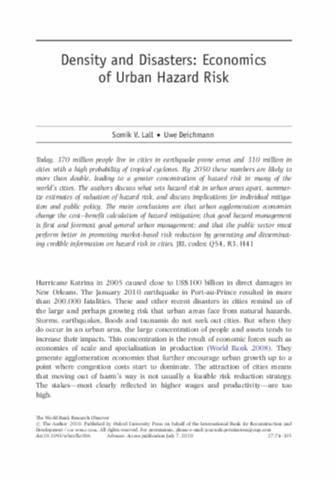The report analyses the contribution to
date of agricultural water management to poverty reduction
and growth in the in sub-Saharan Africa region, the reasons
for its slow expansion and apparently poor track record, as
well…
This paper examines whether the Sub-Saharan African economies could gain from multilateral trade reform in the presence of trade preferences. The World Bank's LINKAGE model of the global economy is employed to examine the impact first of current trade barriers and agricultural subsidies,…
Energy poverty is a global problem: access to energy services is crucial to meet basic household needs, deliver and access public services, and generate income. Less than 10 percent of Sub-Saharan (SSA) rural households have access to electricity, with an overall access rate below 25 percent.…
Energy poverty is a global problem: access to energy services is crucial to meet basic household needs, deliver and access public services, and generate income. Less than 10 percent of Sub-Saharan (SSA) rural households have access to electricity, with an overall access rate below 25 percent.…
Is Land Titling in Sub-Saharan Africa Cost-Effective? A cost benefit analysis suggests that the current system of formal titling should not be extended in rural Madagascar and that any new system of land registration would have to be quite inexpensive to be worthwhile. Indeed, establishing a…
Today, 370 million people live in cities in earthquake prone areas and 310 million in cities with a high probability of tropical cyclones. By 2050 these numbers are likely to more than double, leading to a greater concentration of hazard risk in many of the world's cities. The authors…
This report aims to improve the knowledge base for scaling-up investments in land management technologies that sequester soil carbon for increased productivity under changing climate conditions. The report presents the following key messages.
Sustainable land management technologies…
This report evaluates the progress achieved in forest management by indigenous people and local communities, which was set as a key objective at the 1992 Earth Summit held in Rio de Janeiro, Brazil. It presents new findings and identifies what needs to done to protect global forest areas and…
A workshop held in Midrand, South Africa, in May 2011 brought together policy and decision-makers, researchers and practitioners to discuss water security issues in eastern and southern Africa. This proceedings document summarises the workshop's outcomes with the aim of:
improving…
This discussion paper seeks to explore alternative investment options with the aim of enhancing resilience in the Horn of Africa. Climate change, conflict, drought and increasing populations are leading many to pessimistic conclusions regarding the future viability of pastoral farming, arguing…
Food cannot be grown without water. In Africa, one in three people endure water scarcity and climate change will make things worse. Building on Africa’s highly sophisticated indigenous water management systems could help resolve this growing crisis, but these very systems are being destroyed by…
This book covers the whole Nile Basin and is based on the results of three major research projects supported by the Challenge Program on Water and Food (CPWF). It provides unique and up-to-date insights on agriculture, water resources, governance, poverty, productivity, upstream–downstream…




